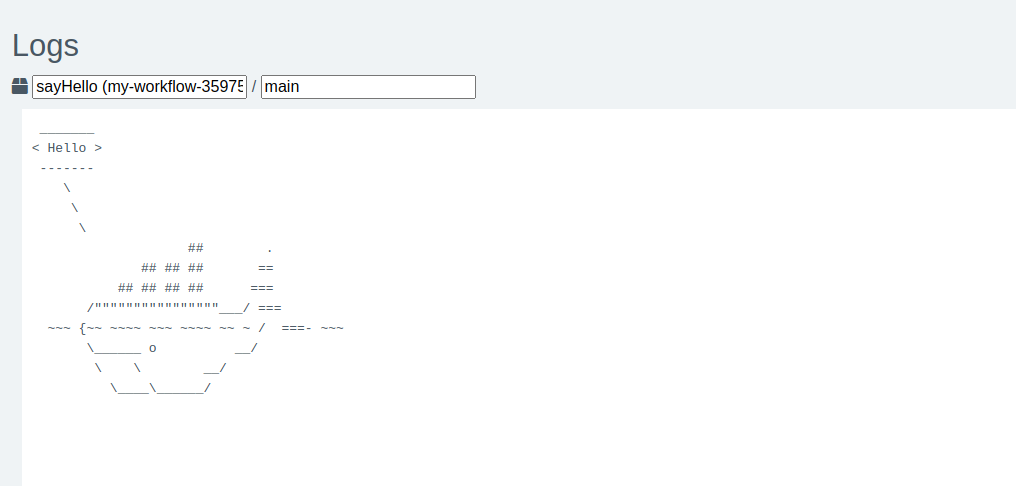Running workflows in you k8s cluster: Argo Workflows

Simplifying it, a workflow is a list of tasks to run in some order and/or fulfilling some dependencies, for example, if we have 5 tasks to run: A, B, C, D, E.
Task C depends on finishing tasks A and B, task D depends on finishing C and E
Something like this:
There are several tools to orchestrate that, but we’ll focus on Argo Workflows
Argo Workflows is an open-source container-native workflow engine for orchestrating parallel jobs on Kubernetes.
Running over Kubernetes is one of the most characteristic things of Argo differentiating it from others.
Every task you define will run in a container or using other words, you must create a container to run the tasks, and all of it will run in your Kubernetes cluster
Install Argo Workflows
Installing Argo Workflows is very easy, you only need to apply a manifest in your cluster to configure Argo’s services in the cluster:
For example https://raw.githubusercontent.com/argoproj/argo-workflows/master/manifests/quick-start-postgres.yaml
More info: https://argoproj.github.io/argo-workflows/quick-start/
Argo Workflows also provides a URL to access a UI to manage Workflows, Events, Reports, Users, Docs, etc…
To keep track of the workflows, etc. Argo needs persistence for example: Postgres, MySQL, etc…
As is indicated in the official documentation is highly recommended create a namespace (ex. argo) in the cluster to “install” into it all Argo’s services.
Workflows
There are two types of workflows: Regular workflows and Cron Workflows
Both are basically the same, but a cron workflow creates a Regular workflow automatically when should be executed according to the cron syntax, ex. */3 * * * * *. Note it can create more than one workflow
Workflows are defined as Kubernetes manifest that should be applied to the same namespace as Argo services.
This manifest defines all the tasks and their dependencies
apiVersion: argoproj.io/v1alpha1
kind: Workflow
metadata:
name: my-workflow
apiVersion: argoproj.io/v1alpha1
kind: Workflow
metadata:
generateName: my-workflow
spec:
entrypoint: tasksDependencies # This is the name of the template to run first
templates:
- name: exampleTask
inputs:
parameters:
- name: msg
container:
image: docker/whalesay
command: [cowsay]
args: [{{ inputs.parameters.msg }}]
- name: tasksDependencies
dag:
tasks:
- name: sayHello
template: exampleTask
arguments:
parameters:
- name: text
value: "Hello"
- name: sayNiceJob
template: exampleTask
dependencies: [ sayHello ]
arguments:
parameters:
- name: text
value: "Nice Job"
- name: sayRunning
template: exampleTask
dependencies: [ sayHello ]
arguments:
parameters:
- name: text
value: "Running"
- name: sayFinished
template: exampleTask
dependencies: [ sayRunning, sayNiceJob]
arguments:
parameters:
- name: text
value: "It's over"
spec:
entrypoint: exampleTask # This is the name of the template to run first
templates:
- name: exampleTask
inputs:
parameters:
- name: msg
container:
image: docker/whalesay
command: [cowsay]
args: ["{{ inputs.parameters.msg }}"]
- name: tasksDependencies
dag:
tasks:
- name: sayHello
template: exampleTask
arguments:
parameters:
- name: msg
value: "Hello"
- name: sayNiceJob
template: exampleTask
dependencies: [ sayHello ]
arguments:
parameters:
- name: msg
value: "Nice Job"
- name: sayRunning
template: exampleTask
dependencies: [ sayHello ]
arguments:
parameters:
- name: msg
value: "Running"
- name: sayFinished
template: exapleTask
dependencies: [ sayRunning, sayNiceJob]
arguments:
parameters:
- name: msg
value: "It's over"
Let’s explain this example, but in the first view you can see the power of Argo
A template defines a job to be done, can be a container (as in our example), a script, a resource (to do operations on the cluster’s resources directly from the workflow) and suspend that is just to wait the time defined.
In our example, we defined a template called exampleTask (this name must be unique and can be used to refer to this template).
For the task, we define one input parameter, a msg to print. This value can be referenced later.
This task uses a container with the image docker/whalesay from docker registry, but you can use your own and private registry, Argo runs the command [cowsay] and uses the input values defined previously as command arguments [{{inputs.parameters.text}}]
Templates also can define Template Invocators, that are used to call other templates and do execution control, in our example we are using DAG ((Directed Acyclic Graph)[https://airflow.apache.org/docs/apache-airflow/1.10.12/concepts.html#:~:text=In%20Airflow%2C%20a%20DAG%20%E2%80%93%20or,and%20their%20dependencies)%20as%20code.]), but we can use also steps, but that allows us to create better dependencies
In our case we are defining 3 tasks, all use the same template with different params (but we can use different templates for different tasks), the entry point is sayHello and sayNiceJob and sayRunning after that, and finally sayFinished only will run after sayNiceJob and sayRunning.
An after applying the manifest: kubectl -n argo -f workflow.yml Argo runs it
This is how the workflow looks after running it

Clicking over a task we can get information about the run: the summary, the input and outputs, the container involved in the run, and the logs or the run

To summarizing, if you have a Kubernetes cluster and need to run workflows, Argo is a very good option.
I will write more blog post in the future about Argo, for example how to configure the access security.
